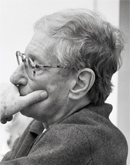

Bernardo Secchi
*2. 6. 1934 – Milan, Italy
†15. 9. 2014 – Milan, Italy
Biography
Bernardo Secchi was an Italian urban planner, theorist, emeritus professor at IUAV in Venice, and dean of the Faculty of Architecture at the Milan Polytechnic.
For almost half a century, he was a central figure in European and Italian interdisciplinary debates on contemporary urbanism. His research was situated within broader discourses on space and social changes, influenced by French theorists after 1968 and particularly fueled by extensive studies of European urban areas. In his practice, he developed plans and visions for both small and large cities in Italy and Europe, including Milan, Jesi, Brescia, Pesaro, Siena, Ascoli Piceno, Bergamo, Prata, Pescara, Lecce, Madrid, Antwerp, Brussels, and Moscow. In 2008, he was one of ten architects selected to develop a vision for Greater Paris; his idea of "ville poreuse" focused on improving the permeability and accessibility of the city.
As a scholar, he was fascinated by the manifold stories and multidisciplinary nature of urban areas. In his books, he presented the creative tension of the economic, political, and cultural dimensions of urbanism, supported by theoretical insights and backed by involvement in spatial realities and projects. He approached the transformations of cities with lively and contemporary analyses, using theories as productive tools for exploration to clarify society and space, rather than mere self-referential intellectual gestures.
Bernardo Secchi was an Italian urban planner, theorist, emeritus professor at IUAV in Venice, and dean of the Faculty of Architecture at the Milan Polytechnic.
For almost half a century, he was a central figure in European and Italian interdisciplinary debates on contemporary urbanism. His research was situated within broader discourses on space and social changes, influenced by French theorists after 1968 and particularly fueled by extensive studies of European urban areas. In his practice, he developed plans and visions for both small and large cities in Italy and Europe, including Milan, Jesi, Brescia, Pesaro, Siena, Ascoli Piceno, Bergamo, Prata, Pescara, Lecce, Madrid, Antwerp, Brussels, and Moscow. In 2008, he was one of ten architects selected to develop a vision for Greater Paris; his idea of "ville poreuse" focused on improving the permeability and accessibility of the city.
As a scholar, he was fascinated by the manifold stories and multidisciplinary nature of urban areas. In his books, he presented the creative tension of the economic, political, and cultural dimensions of urbanism, supported by theoretical insights and backed by involvement in spatial realities and projects. He approached the transformations of cities with lively and contemporary analyses, using theories as productive tools for exploration to clarify society and space, rather than mere self-referential intellectual gestures.
The English translation is powered by AI tool. Switch to Czech to view the original text source.








